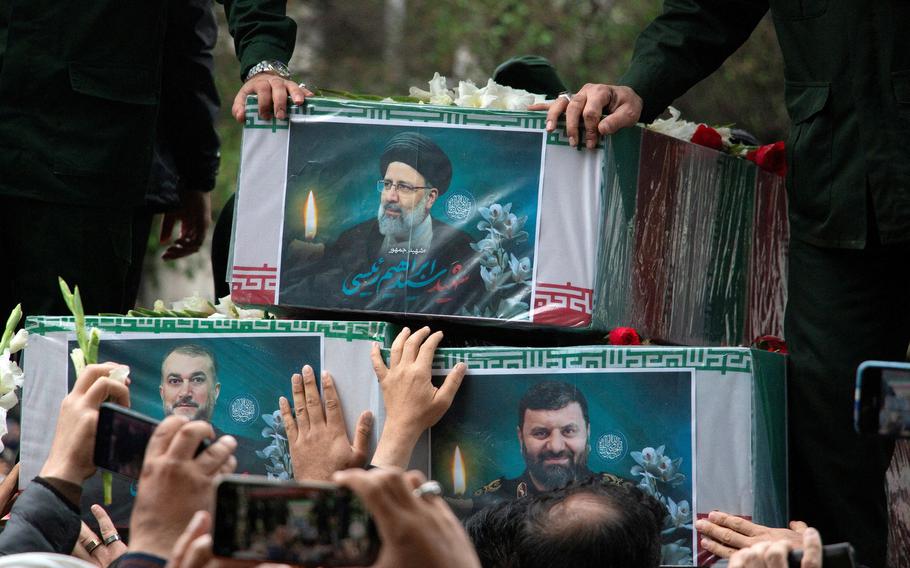
A picture of the late Iranian President Ebrahim Raisi is seen on his coffin during a funeral ceremony held in Tabriz, East Azerbaijan Province, Iran, May 21, 2024. (West Asia News Agency via Reuters)
With the untimely death of Iranian President Ebrahim Raisi, the so-called “Butcher of Tehran,” and the country’s foreign minister, Hossein Amirabdollahian, in a helicopter crash in an eastern province of Iran near Azerbaijan earlier this week, U.S. officials would be wise to take stock of Tehran’s escalating human rights abuses and the rising discontent on the Iranian street.
On April 13, the Islamic Republic launched more than 300 drones and missiles at Israel. Iranian forces subsequently seized a commercial vessel in the Persian Gulf based on the vague pretense that it had connections to the Jewish state. On the same day, the regime initiated a fresh crackdown on dissent and dramatically stepped up the public harassment of women deemed to be in violation of the mullahs’ strict Islamic dress code.
The simultaneous actions demonstrate how Tehran leverages malign activities to further its strategic interests by using attacks on Israel as cover for and distraction from domestic repression intended to suppress democratic mobilization. Efforts to crush pro-democracy forces have been evolving ever since Iranian activists staged nationwide protests in September 2022.
Although Iranian authorities killed 750 protesters within the first several weeks of that rebellion and arrested another 30,000, the unrest persisted for months and the ripple effects continue to this day.
At least nine participants in that uprising have been executed to date, and dozens of others have been sentenced to death or indicted on charges that could carry the death penalty. The fundamentalist regime has evidently been hesitant to implement these sentences as rapidly as it might have under other circumstances, fearing persistent international scrutiny and the threat of expanded unrest. But in lieu of those plainly political executions, authorities have overseen a dramatic overall surge in the rate of executions for all manner of crimes, especially those that do not rise to international standards of “most serious.”
Over the course of last year, more than 860 people were executed. So far this year, 245 more death sentences have been carried out, with nearly half of them coming over the past month. At the same time, the regime has been letting slip its prior reticence to stoke backlash by killing inmates for reasons purely related to their affiliations and political expression.
Even while it ignored the mounting international outcry over that situation, the Iranian judiciary even passed new death sentences for, among others, the rapper Toomaj Salehi, who sang and posted online about his support for the 2022 uprising, and a social media influencer, Masoud Mehrabi, who had sought to expose corruption among local government officials.
Western governments and international bodies have condemned Iran’s most egregious repressive actions in the wake of the uprising, but they have done very little to reinforce that condemnation through substantive actions.
This is despite the fact that opponents and opposition groups, chiefly the People’s Mojahedin Organization of Iran (PMOI/MEK) and its parent coalition, the National Council of Resistance of Iran (NCRI), have repeatedly outlined concrete steps that they could take to not only deter the regime’s hostile activities but also help the Iranian people achieve the transformative change that would bring an end to those activities once and for all.
Thousands of Western lawmakers have adopted resolutions in recent years recognizing the NCRI as a viable alternative to the theocratic dictatorship and endorsing its 10-point plan for Iran’s future, as presented by its transitional president, Maryam Rajavi. These Western supporters generally recognize that the PMOI-led network of “Resistance Units” operating throughout Iran has continued to fuel public activism in the wake of the 2022 uprising, keeping alive its message of regime overthrow. Yet this awareness has yet to be reflected in the policies of Western political leadership, who remain wary of alienating a regime they have long assumed is free of domestic challenges.
That faulty assumption should have been abandoned long ago, but it most certainly should have been dispatched within the wake of Iran’s latest popular uprising — one of a half dozen to be staged in as many years. The resilience and defiance of the Iranian people represents a clear opportunity for the ouster of Iran’s tyrannical dictatorship, and that opportunity could easily be reinforced by the international community if it would only offer formal recognition of the people’s right to resistance, the NCRI’s political viability, and the illegitimacy of the existing regime.
In practical terms, this long-overdue policy position can be expressed through the closure of Iranian embassies, broadening of sanctions targeting the regime’s human rights abuses and contributions to regional conflict, and designation of the Islamic Revolutionary Guard Corps (IRGC) — the main instrument of both of those malignant activities — as a terrorist organization. The United States finally took that latter step in 2019, but its European allies have yet to follow suit. There is no excuse for continued delay given that the threats posed by the IRGC and the Iranian regime are growing worse with each passing week.
Raisi’s death constitutes a strategic blow to the Islamic Republic and the mullahs’ political bench — both as the sitting president but also a potential heir to Supreme Leader Ali Khamenei. U.S. and European Union officials should seize this propitious moment to present the loathsome Iranian regime with an existential crisis by returning to the maximum pressure strategy that held belligerent figureheads accountable for their theocracy’s executions, massacres and export of terrorism.
Ivan Sascha Sheehan is the associate dean of the College of Public Affairs and past executive director of the School of Public and International Affairs at the University of Baltimore. Opinions expressed are his own.